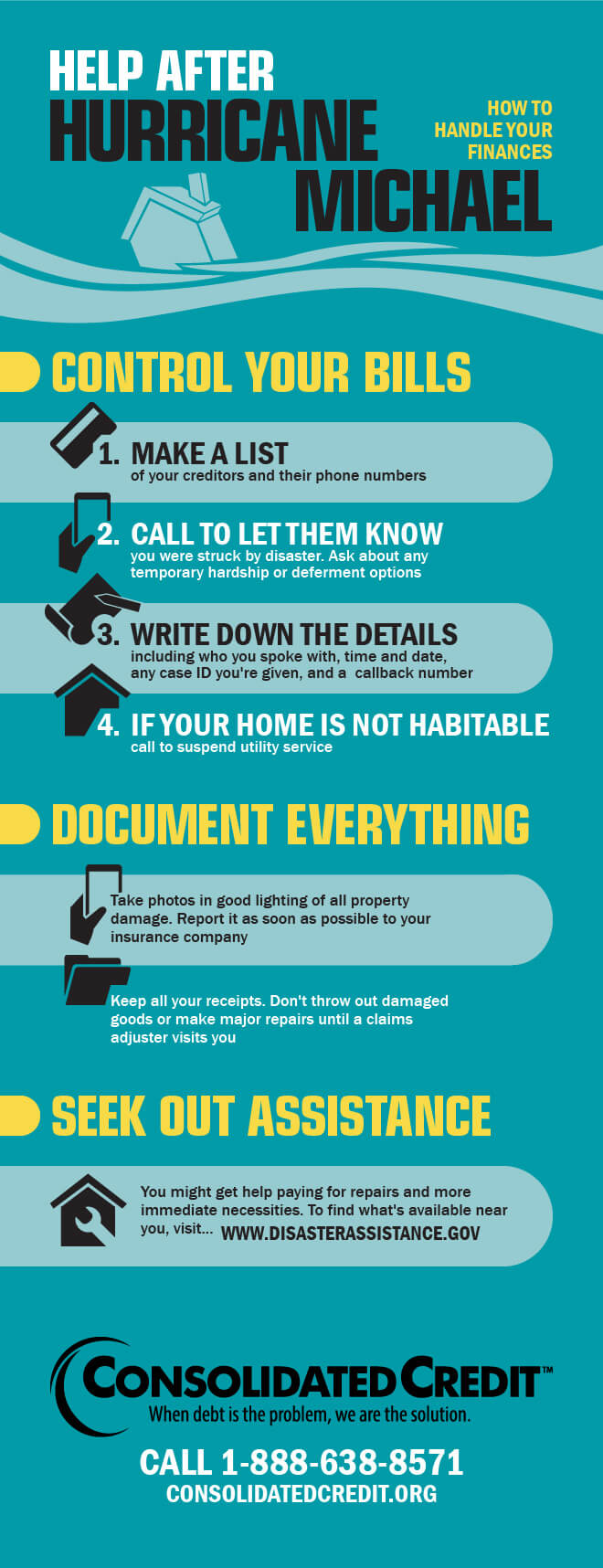As peak hurricane season arrives, many may be facing the difficult aftermath of a natural disaster. Beyond the immediate safety concerns, the financial impact can be significant and long-lasting.
We’ll walk you through the key steps you can take to start rebuilding your financial life after a natural disaster. We’ll cover everything from the immediate actions you should take to understanding insurance, finding assistance, and planning for the future.
Immediate actions & first steps
Right after a natural disaster, acting quickly can set you on the path to financial recovery. Here’s what you should do right away:
Safety first
Your well-being is the top priority. Make sure you and your loved ones are safe and have immediate needs like shelter, food, and clean water covered.
Document the damage
Before you start cleaning up, take clear pictures and videos of all the damage. Also, make a list of everything that was damaged or lost. This record will be important later.
Contact Your Insurance
Get in touch with all your insurance companies right away. This includes your homeowner’s or renter’s insurance, flood insurance (if you have it), car insurance, and any other relevant policies. Ask about deadlines for filing claims and what paperwork they need from you.
Register for help
Sign up for assistance from FEMA (the Federal Emergency Management Agency) and any other government programs that can provide aid. Also, reach out to local and state disaster relief organizations for support.
Assessing your financial situation
To start rebuilding financially, it’s important to get a clear picture of where you stand. Here’s how to assess your current financial situation:
Gather your financial information
Collect important documents like bank statements, credit card statements, and investment account details. Also, find pay stubs, tax returns, loan documents, and any other papers that show your financial situation before the disaster.
Figure out your losses
Estimate how much it will cost to repair or replace any damaged property. If you’ve lost income because your business closed or you lost your job, calculate that as well. Don’t forget to include any extra costs you’re facing now, like temporary housing.
Plan your spending after the disaster
Keep track of the essential things you need to spend money on. Look for ways to reduce your spending where possible. Make a list of the most important bills to pay first.
Working with your insurance
Dealing with insurance claims is a big part of financial recovery. Here’s what you need to do:
Know what your policy covers
Take a close look at your insurance papers. Understand your deductible (what you pay first), how much your policy will cover, and what isn’t covered. Don’t be afraid to ask your insurance adjuster to explain anything you don’t understand.
File your claims quickly and correctly
Give your insurance company all the papers and information they ask for. Keep a record of every time you talk to them, including dates and what was said.
Talking to your insurance adjuster
Know what your rights are and how the claims process works. If you need help understanding things or disagree with the insurance company, you might want to consider hiring a public adjuster to help you.
If your claim isn’t approved
Find out why your insurance claim was denied. You usually have options to appeal their decision or try to work things out through mediation.
Finding more financial help
Besides insurance, there are other places you can look for financial support after a disaster:
Government help (besides FEMA)
The Small Business Administration (SBA) offers disaster loans to homeowners, renters, and businesses. Your state and local governments might also have their own assistance programs. Check what’s available in your area.
Charities and nonprofits
Groups like the Red Cross and the Salvation Army, as well as local community foundations and other disaster relief organizations, often provide help. See if they offer grants or other direct aid.
Getting relief on your loans
If you have a mortgage, car loan, or student loans, contact your lenders. They might have options to temporarily pause or reduce your payments.
Help managing your debt
If you’re feeling overwhelmed by debt, consider talking to a trusted credit counseling agency. They can offer advice and help you create a plan.

Rebuilding and moving forward
As you start to rebuild, focus on what needs to be done first to make your home safe to live in again. When you need to hire someone for repairs, get quotes from a few different qualified contractors. This will help you compare prices and make sure you’re getting good work for a fair cost.
Looking ahead, it’s a good time to review your budget and make any changes needed based on your current situation. Also, think about your insurance coverage. Does it still meet your needs? It might also be wise to start saving an emergency fund specifically for future unexpected events.
Be careful of people who might try to take advantage of you after a disaster. Watch out for repair offers or financial help that seem too good to be true. Always check the credentials of anyone you’re working with and get information from reliable sources.
Finally, remember that recovering financially can also take an emotional toll. It’s okay to feel stressed or overwhelmed. Lean on your family and friends for support, and don’t hesitate to reach out to mental health professionals if you need extra help.
